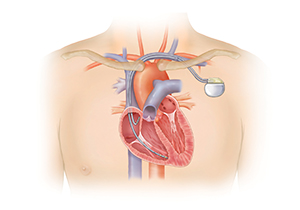Treating Syncope: Helping Your Heart
Treating Syncope: Helping Your Heart
If heart trouble caused your fainting, treatment may improve blood flow, stop syncope, and help prevent further heart problems. Your healthcare provider can explain the benefits and risks of each treatment.
Pacemaker or ICD
These devices can help speed up or slow down your heartbeat. They are implanted under the skin in the chest during a simple surgery. Once you have a pacemaker or an ICD, see your healthcare provider as directed. He or she will want to check the device and your heart rhythm:
A pacemaker
A pacemaker can speed up a slow heartbeat. When needed, the pacemaker sends an electrical impulse to the heart, telling it to beat faster.
An ICD
An ICD (implantable cardioverter defibrillator) treats fast, dangerous heart rhythms. It sends 1 or more brief shocks to the heart to restore normal heart rhythm in a matter of seconds. An ICD can also act as a packemaker if needed to help support a slow heart rate.
Other treatments
In some cases, your doctor may suggest a procedure or surgery. These can provide a long-term solution for certain heart problems:
Catheter ablation
Catheter ablation treats a fast heartbeat by locating and destroying abnormal circuits using either heat or cold therapy. This is a non-surgical procedure that involves threading a thin wire through a vein in the leg and guiding it to the heart.
Heart valve surgery
Valve surgery may be an option if syncope is caused by an abnormal heart valve. Most often, severe narrowing of the aortic valve is the cause of syncope. This is the valve that opens to let blood out to your body. The valve is replaced with a new healthy valve. This can restore normal blood flow through the heart and prevent syncope.
Septal alcohol ablation or surgical septal myectomy
In some people, the blood can't leave the heart because the muscle becomes enlarged or thickened (hypertrophied) along one of the ventricle walls (septum). For some people, medicine can relax this area of the heart and blood can move out to the body. In others, the tract through the heart is too narrow and blood still can't get out to the body or to the brain and this can cause syncope. Using a catheter or open surgery, your doctor can thin out the muscle and improve blood flow.
Coronary stents or bypass surgery
When the arteries feeding the heart muscle become very narrowed it can cause a heart attack and irregular heart rhythms. This can affect blood pressure and circulation of oxygen and blood to the brain and may cause syncope. By restoring blood flow to the heart muscle the blood pressure and circulation to the brain and all parts of the body improves. If you have coronary artery disease, you may need these blockages treated with stents, small mesh tubes that fit inside the blood vessels to keep blood flow open to the artery. Or you may need surgery to bypass around the blocked or narrowed arteries. In some cases, these procedures are planned or done as an emergency treatment for a heart attack or acute myocardial infarction (AMI).
To know what treatment is best for you, you will undergo testing. Until you have a treatment plan, do not engage in activities that could result in injury to yourself or others if you were to experience syncope or loss of consciousness. Ask your healthcare provider when it will be safe for you to resume driving, or other activities for work or recreational.
Updated:
June 24, 2017
Sources:
Hypertrophic cardiomyopathy: Nonpharmacologic treatment of lfeft ventricular outflow tract obstruction, Up To Date, management of syncope in adults, Up To Date, Overview of the acute management of ST elevation myocardial infarction, Up To Date
Reviewed By:
Image reviewed by StayWell medical illustration team.,Kang, Steven, MD,Snyder, Mandy, APRN
